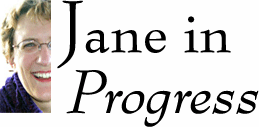 |
|
 |
 |
Looking for tips and tricks to the art of writing for television? Welcome to the blog of experienced television writer Jane Espenson. Check it out regularly to learn about spec scripts, writing dos and don'ts, and what Jane had for lunch! (RSS:  ) |
|
|
Home » Archives » February 2007 » (There's No Such Thing as Tylium)
[Previous entry: "Clamity Jane"] [Next entry: "Going Back to Pick up the Heart I Left There"]
02/26/2007: (There's No Such Thing as Tylium)
Wow. Didn't the actors and production people and everyone do a great job on Anne Cofell Saunder's and my Battlestar ep, "Dirty Hands"? I was so pleased with how it came out. Whee!
For those of you who didn't see it (possibly because you were watching the Academy Awards), the episode took place partly in a facility that converts Tylium ore into spaceship fuel. I don't know anything about this fascinating but fictional process, and I don't think Anne does either. So what does one do when one has to write about something both technical and fictional?
Well, here's part of a scene that I wrote into an early draft (it differs a bit from what was shot, but not by too much):
FENNER
Here's where we had the problem last time. The temp on this machine fell, but the indicator was stuck. We didn't know. The dross didn't all get burned off...
TYROL
Bad fuel.
FENNER
It's working now, but we've got a half-dozen other places along the line that could frak us.
The belt near Tyrol starts stuttering, moving forward jerkily instead of smoothly. A few workers SHOUT. The problem must be permeating down the line.
TYROL
Shut it down! Hit the switch!
FENNER
No! Not when it's jammed! The whole system will seize up!
Then the belt stops altogether, with a GRINDING WHINE as the mechanism tries to keep pushing the belt forward. Tyrol and Fenner both instantly react, moving under the belt, looking for where it’s catching.
FENNER (cont'd)
Find it. If it stops, the ore that's in the chamber will superheat...
Did you see what I did there? I totally faked it. But I faked it with authority. It's really a matter of making sure that the people talking about the process sound like they know what they're talking about.
And the best thing is that since they all know what they're talking about, they can do it in a sort of professional shorthand that sounds real and also avoids too much detail. The worst thing to do in this kind of a writing situation is fall into "as you know" writing, in which characters explain things to each other for the benefit of the audience. Don't worry if the audience doesn't get exactly what's happening, just make sure they understand the consequences of what's happening.
Lunch: salad from the Universal salad bar and a selection of Hershey miniatures
|
|
|
 |
|
Get Blog Updates Via Email
|
|
 |

